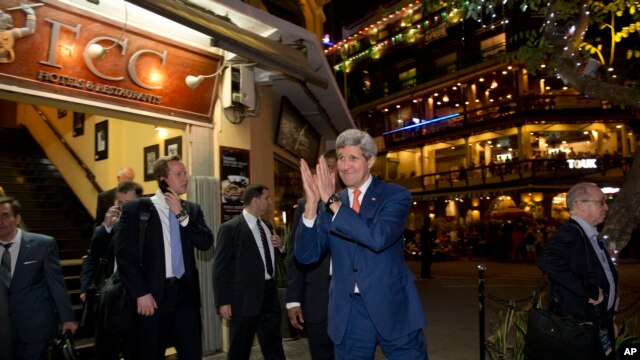US, China Competing for influence with Cambodia
Kerry will
visit Phnom Penh to discuss bi-lateral trade and strengthening ties with
the Cambodian government ahead of a summit with ASEAN leaders and
President Obama in California next month.
U.S.
Secretary of State John Kerry returns a warm greeting from a crowd as
he leaves the Foreign Correspondents Club Restaurant in Phnom Penh,
Cambodia, Monday, Jan. 25, 2016. Kerry is in Cambodia on the fourth leg
of his latest round-the-world diplomatic mission, which will also take
him to China. (AP Photo/Jacquelyn Martin, Pool)
PHNOM PENH—U.S. Secretary of State
John Kerry is being pressed to ensure that democratic reforms and human
rights are at the top of the agenda when he meets with Cambodia's Prime
Minister Hun Sen, leader of the ruling Cambodia People's Party, in Phnom
Penh on Tuesday.
With opposition leader Sam Rainsy in self-imposed exile to avoid what
is widely considered to be politically motivated charges and 17
opposition members and activists in prison, rights groups say any
improved diplomatic ties must be accompanied with Cambodian guarantees
for reform.
However, through its refusal to speak up with several of its fellow
ASEAN members over territorial claims in the South China Sea, Cambodia
finds itself in a position of increasing political leverage in the
US-China race for influence in the region.
"Cambodia is actually one of the small countries that shouldn't have as much of an influence on that kind of political power play, but because Cambodia is a part of ASEAN that is why Cambodia is becoming a key country," said Ou Virak, a political analyst and founder of the Future Forum think tank.
"But also because Cambodia is so close to China and has been somewhat
of a Chinese pawn in the sense of an ASEAN unity, Cambodia has now
become a key small country for the U.S. real pivot to Asia."
Kerry will visit Phnom Penh to discuss bi-lateral trade and
strengthening ties with the Cambodian government ahead of a summit with
ASEAN leaders and President Obama in California next month.
Since the early 1990s, aided by favorable tax preferences on exports
to the U.S and the EU, Cambodia's garment industry has grown from close
to one per cent of GDP to close to 10 per cent of GDP today. In the
first six months of 2015, the sectors exports were valued at more than
$3 billion and employing more than 600,000 workers.
This is the greatest economic contribution from the U.S. to Cambodia, said government spokesman Phay Siphan.
But he added that it comes with conditions, which include promoting human rights and democratic reforms in the country.
China, on the other hand, doesn't apply the same conditions to their
loans for much needed infrastructure - like roads and hydro dams to keep
up with the rapid growth in one of Asia's fastest growing countries, he
said.
"We understand from the west it is sustainability that we wish and we
respect that, and from China we don't mind what way they rule the
country, but we want a good partner in the economy's survival."
Siphan defended the government against allegations of rights abuses,
saying the U.S needs to change its "one size fits all policy" and have a
deeper understanding of diversity in ASEAN.
"We are educated from the United States and we understand that, but
you cannot force everyone to eat hamburgers," he said, adding that
Cambodia remains constitutionally neutral in its relationships with
Beijing and Washington.
Unsurprisingly, the opposition Cambodia National Rescue Party sees things differently.
According to opposition lawmaker Son Chhay, the Hun Sen government
views U.S. foreign policy as encroaching on its sovereignty, which has
led the ruling party to lean towards China, who he said has done little
to support economic development in Cambodia.
Chhay agreed that Cambodia needs to remain neutral, but said his
party's values more closely align with that of the U.S., who he said has
an obligation to uphold in Cambodia.
"You can not use Cambodia and try to be nice and look the other way
when it comes to the interest of the United States over this Chinese
issue," he added.
Meanwhile, following a narrow victory for the ruling party in the
highly-contested 2013 elections analysts say that Prime Minister Hun Sen
will be seeking a public relations coup with his trip to California
next month.
"I think that close relationships with Washington offer him prestige
and legitimacy and his visit to California next month for the US-ASEAN
summit is interpreted within the Cambodian government as a victory,"
said Sebastian Strangio, Phnom Penh based journalist and author of Hun
Sen's Cambodia.
Political analyst Ou Virak said the U.S. will expect some concessions
from Hun Sen in return for that legitimacy, something the PM has
already planned for well in advance with charges leveled at the
opposition.
"The question is can Kerry get the commitment of Hun Sen and the CPP
in a way that is concrete enough, in a way that is going to last long
enough and is going to be significant enough in shaping the future of
regional security," he said.



No comments:
Post a Comment